|
|
|
Sort Order |
|
|
|
Items / Page
|
|
|
|
|
|
|
| Srl | Item |
| 1 |
ID:
160611
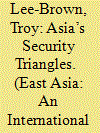

|
|
|
|
|
| Summary/Abstract |
Since the early years of the twenty-first century, a number of key regional governments have consciously chosen to alter the way they talk about the region, and have now largely shifted from using the ‘Asia-Pacific’ to the ‘Indo-Pacific’ construct. But after three decades of utilising the ‘Asia-Pacific’ concept, why has this been the case and how might this shift in geographical conceptualisation alter the strategic framework of the region? This paper argues that the ‘Indo-Pacific’ is a regional reconceptualisation utilised by Japan, Australia, India and the USA to address deficiencies in Asia’s maritime security and institutional architecture, which are being simultaneously influenced by a more assertive Chinese posture and waning U.S. influence. Additionally, the Indo-Pacific concept has developed in tandem with a transformation in the regional security architecture. The utilisation of maritime minilateralism between Japan, India, Australia and the USA supplements Asia’s bilateral American alliances, with an array of trilateral security dialogues or ‘security triangles’. The Asia-Pacific to Indo-Pacific shift is really an instance of an emerging minilateral security regionalism, rather than the predominant forms of bilateral and multilateral security and economic regionalism that have dominated Asia in recent decades.
|
|
|
|
|
|
|
|
|
|
|
|
|
|
|
|
| 2 |
ID:
160608
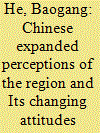

|
|
|
|
|
| Summary/Abstract |
The existing literature on the Indo-Pacific has largely focused on how and why the USA, Japan, Australia, India, and Indonesia have promoted the strategic concept of the Indo-Pacific, and how China has rejected it in the domain of maritime security. What has been overlooked, however, are dramatically expanded Chinese perceptions of the region and changing and complex Chinese attitudes and responses toward the Indo-Pacific. This essay aims to fill this gap by demonstrating how China has coopted certain components of the Indo-Pacific in its geoeconomic hegemonic project. This can be partially explained by unfolding and expanding Chinese perceptions of the region, characterized by geoeconomics and maritime/continental hybridity. This paper brings a missing perspective to the debate by highlighting China’s evolving, complex, and multifaceted approaches regarding the Indo-Pacific. It also offers a conceptual tool of a hybrid vision of the institutionalization of the Indo-Pacific for the enterprise of regional cooperation.
|
|
|
|
|
|
|
|
|
|
|
|
|
|
|
|
| 3 |
ID:
160605
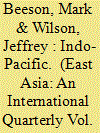

|
|
|
|
|
| Summary/Abstract |
There is nothing natural, timeless, or essential about regions. The very idea of regions is necessarily a comparatively modern artifact of human history. While there is still debate about quite who discovered whom, the general point is clear: until advances in navigation and exploration made connections feasible between geographically remote places, the very idea of different, separate regions was impossible. Without an “other” to be identified in opposition with, no sense of distinct regional identity or boundaries is possible. Even when it became apparent to Europeans that there was an entire “new world” beyond the horizon about which they had only limited or no knowledge, it would take a long time before the contours and boundaries of new regions would be understood and mapped. Significantly, the East Asian part of this unknown world was not only more economically developed, “civilized,” and technologically advanced than Europe [6, 8], but some of the patterns of interaction that existed before European intrusion have had enduring consequences.
|
|
|
|
|
|
|
|
|
|
|
|
|
|
|
|
| 4 |
ID:
160606


|
|
|
|
|
| Summary/Abstract |
One of the key issues that will determine the success or otherwise of the putative ‘Indo-Pacific region’ is how or whether it is successfully institutionalized. This paper firstly provides an assessment of the Indo-Pacific’s prospects by drawing on some of the more influential strands of theoretical literature in this area and by considering the specific historical experience of its institutional precursors in the more expansively conceived Asia-Pacific region. Although I am skeptical about the Indo-Pacific’s prospects, the following discussion provides a general framework for assessing institutional efficacy. The second objective of this essay is to introduce the other papers in this collection. Significantly, some of the other contributors are more optimistic about the Indo-Pacific. Together, these papers highlight the sometimes competing and contradictory forces of what could still be a very significant initiative in a region in which effective institutions are arguably in short supply.
|
|
|
|
|
|
|
|
|
|
|
|
|
|
|
|
| 5 |
ID:
160609
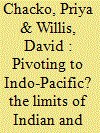

|
|
|
|
|
| Summary/Abstract |
Proponents of the Indo-Pacific concept assume that growing economic and societal linkages and the need for greater political and security cooperation and order-building are leading to the integration of the region. India and Indonesia were thought to be crucial in these processes of regionalisation and regionalism and were early adopters of the Indo-Pacific idea. The purpose of this paper is to evaluate the extent to which the Indo-Pacific initiatives of India and Indonesia are leading to the integration of the Asia-Pacific and Indian Ocean regions through greater Indian involvement with the Pacific region and stronger Indonesian engagement with the Indian Ocean region. It is argued that an interlinked set of security and economic concerns drove India and Indonesia’s adoption of the Indo-Pacific idea. In both cases, a desire for economic growth and preventing Chinese economic and political dominance in the region were important drivers. However, the nature of the political economies of India and Indonesia does not readily facilitate extensive economic linkages or strategic interests beyond their immediate regions. Moreover, both countries are wary of being seen as members of anti-China coalitions due to the impact this may have on regional stability and their domestic political and economic priorities. These factors place significant limitations on the regional integration of the Indo-Pacific.
|
|
|
|
|
|
|
|
|
|
|
|
|
|
|
|
| 6 |
ID:
160612


|
|
|
|
|
| Summary/Abstract |
The ‘Indo-Pacific’ has emerged as the newest addition to the lexicon of Asian regionalism. Conceived of as the conjunction of the Pacific and Indian Oceans, it reflects the belief that maritime linkages require extending Asian regionalism westwards to include countries on the Indian Ocean rim. It also competes with the longstanding ‘Asia-Pacific’ conceptualisation of the region, and four governments—Australia, India, Japan and the USA—have adopted it into their foreign policies. Much of the debate on the Indo-Pacific focusses on how it institutionally ‘rescales’ Asian regionalism through the incorporation of Indian Ocean states. This article considers the functional rescaling that attends this process: namely, what kind of regionalism is implied by the Indo-Pacific concept? It argues that the Indo-Pacific is a security-focussed regional project, reflecting the desire of its proponents to form a quadrilateral bloc to resist China’s growing maritime assertiveness. This security region is radically different from the Asia-Pacific concept, where regionalism was primarily driven by economic integration and cooperation. The Indo-Pacific thus marks a more contested period in Asia’s international politics, where the functional purpose of regional cooperation is being reoriented from economic- to security-focussed agendas.
|
|
|
|
|
|
|
|
|
|
|
|
|
|
|
|
| 7 |
ID:
160607
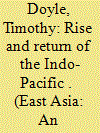

|
|
|
|
|
| Summary/Abstract |
The Indo-Pacific, constructed either as a region, super-region or non-region, is currently a hotly contested map-making phenomenon. Various countries and cultures, washed by the waters of these amorphous oceanic boundaries and sea spaces, are currently seeking to establish exclusive territorial claims over these water spaces by invoking stories and narratives taken from pre-colonial, colonial and post-colonial eras. These stories are often used in an attempt to legitimate “natural”, and more essentialist relationships between certain cultures and/or nation-states with their surrounding seas. These narratives both challenge the broader international system and its rule of law, and create internal narratives, strengthening domestic and national support for state-building programs in the region/s. But the Indo-Pacific is more than a contestation between nation-statist imaginations and aspirations. It also invokes stories which seek to develop and celebrate a shared “maritime regionalism” beyond the exclusive and usually dominant politics of nation-states. Finally, a third interpretive category is used: the construction of the Indo-Pacific as a globalised “non-space”.
|
|
|
|
|
|
|
|
|
|
|
|
|
|
|
|
| 8 |
ID:
160610


|
|
|
|
|
| Summary/Abstract |
This paper examines the three faces of the Indo-Pacific from an IR theory perspective. It suggests that the realist face of the Indo-Pacific is a “balancing strategy” against China. The liberal face of the Indo-Pacific aims to form a new “institutional setting” that facilitates cooperation among states across the Pacific and the Indian Oceans. According to constructivism, the Indo-Pacific offers an “ideational construct” for promoting value-oriented and norm-based diplomacy in the region. This paper argues that these three faces of the Indo-Pacific concept are theoretically problematic and practically flawed. There are two ways of institutionalizing the Indo-Pacific, though. One is exclusive institutionalization with China as an outside target, which follows the realist logic of making China a common threat in the region. The success of this approach mainly depends on how China behaves in the future. The other is the inclusive approach of institutionalizing the Indo-Pacific by embracing China and other states into a new Indo-Pacific institution. It will not be easy, but the endeavor of the inclusive institutionalization of the Indo-Pacific will produce positive externalities of peace and stability to the region.
|
|
|
|
|
|
|
|
|
|
|
|
|
|
|
|
|
|
|
|
|